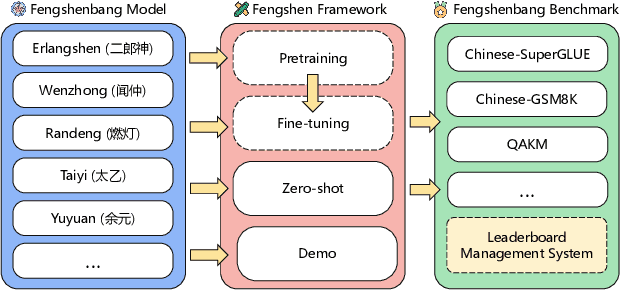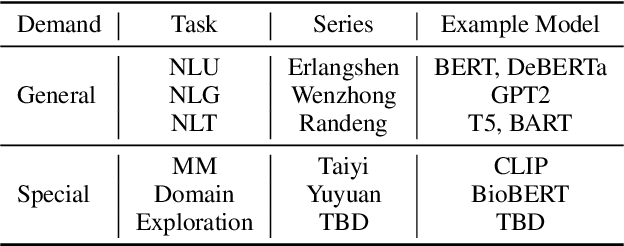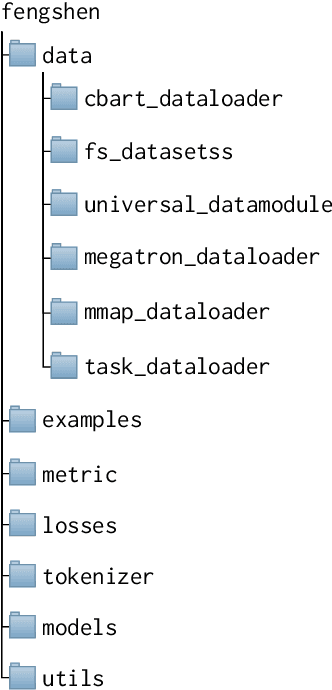Jianheng Zhuo
SLAM-LLM: A Modular, Open-Source Multimodal Large Language Model Framework and Best Practice for Speech, Language, Audio and Music Processing
Jan 14, 2026Abstract:The recent surge in open-source Multimodal Large Language Models (MLLM) frameworks, such as LLaVA, provides a convenient kickoff for artificial intelligence developers and researchers. However, most of the MLLM frameworks take vision as the main input modality, and provide limited in-depth support for the modality of speech, audio, and music. This situation hinders the development of audio-language models, and forces researchers to spend a lot of effort on code writing and hyperparameter tuning. We present SLAM-LLM, an open-source deep learning framework designed to train customized MLLMs, focused on speech, language, audio, and music processing. SLAM-LLM provides a modular configuration of different encoders, projectors, LLMs, and parameter-efficient fine-tuning plugins. SLAM-LLM also includes detailed training and inference recipes for mainstream tasks, along with high-performance checkpoints like LLM-based Automatic Speech Recognition (ASR), Automated Audio Captioning (AAC), and Music Captioning (MC). Some of these recipes have already reached or are nearing state-of-the-art performance, and some relevant techniques have also been accepted by academic papers. We hope SLAM-LLM will accelerate iteration, development, data engineering, and model training for researchers. We are committed to continually pushing forward audio-based MLLMs through this open-source framework, and call on the community to contribute to the LLM-based speech, audio and music processing.
A Comparative Study of LLM-based ASR and Whisper in Low Resource and Code Switching Scenario
Dec 01, 2024



Abstract:Large Language Models (LLMs) have showcased exceptional performance across diverse NLP tasks, and their integration with speech encoder is rapidly emerging as a dominant trend in the Automatic Speech Recognition (ASR) field. Previous works mainly concentrated on leveraging LLMs for speech recognition in English and Chinese. However, their potential for addressing speech recognition challenges in low resource settings remains underexplored. Hence, in this work, we aim to explore the capability of LLMs in low resource ASR and Mandarin-English code switching ASR. We also evaluate and compare the recognition performance of LLM-based ASR systems against Whisper model. Extensive experiments demonstrate that LLM-based ASR yields a relative gain of 12.8\% over the Whisper model in low resource ASR while Whisper performs better in Mandarin-English code switching ASR. We hope that this study could shed light on ASR for low resource scenarios.
k2SSL: A Faster and Better Framework for Self-Supervised Speech Representation Learning
Nov 26, 2024Abstract:Self-supervised learning (SSL) has achieved great success in speech-related tasks, driven by advancements in speech encoder architectures and the expansion of datasets. While Transformer and Conformer architectures have dominated SSL backbones, encoders like Zipformer, which excel in automatic speech recognition (ASR), remain unexplored in SSL. Concurrently, inefficiencies in data processing within existing SSL training frameworks, such as fairseq, pose challenges in managing the growing volumes of training data. To address these issues, we propose k2SSL, an open-source framework that offers faster, more memory-efficient, and better-performing self-supervised speech representation learning, with a focus on downstream ASR tasks. The optimized HuBERT and proposed Zipformer-based SSL systems exhibit substantial reductions in both training time and memory usage during SSL training. Experiments on LibriSpeech and Libri-Light demonstrate that Zipformer-based SSL systems significantly outperform comparable HuBERT and WavLM systems, achieving a relative WER reduction on dev-other/test-other of up to 34.8%/32.4% compared to HuBERT Base after supervised fine-tuning, along with a 3.5x pre-training speedup in total GPU hours.
GigaSpeech 2: An Evolving, Large-Scale and Multi-domain ASR Corpus for Low-Resource Languages with Automated Crawling, Transcription and Refinement
Jun 17, 2024Abstract:The evolution of speech technology has been spurred by the rapid increase in dataset sizes. Traditional speech models generally depend on a large amount of labeled training data, which is scarce for low-resource languages. This paper presents GigaSpeech 2, a large-scale, multi-domain, multilingual speech recognition corpus. It is designed for low-resource languages and does not rely on paired speech and text data. GigaSpeech 2 comprises about 30,000 hours of automatically transcribed speech, including Thai, Indonesian, and Vietnamese, gathered from unlabeled YouTube videos. We also introduce an automated pipeline for data crawling, transcription, and label refinement. Specifically, this pipeline uses Whisper for initial transcription and TorchAudio for forced alignment, combined with multi-dimensional filtering for data quality assurance. A modified Noisy Student Training is developed to further refine flawed pseudo labels iteratively, thus enhancing model performance. Experimental results on our manually transcribed evaluation set and two public test sets from Common Voice and FLEURS confirm our corpus's high quality and broad applicability. Notably, ASR models trained on GigaSpeech 2 can reduce the word error rate for Thai, Indonesian, and Vietnamese on our challenging and realistic YouTube test set by 25% to 40% compared to the Whisper large-v3 model, with merely 10% model parameters. Furthermore, our ASR models trained on Gigaspeech 2 yield superior performance compared to commercial services. We believe that our newly introduced corpus and pipeline will open a new avenue for low-resource speech recognition and significantly facilitate research in this area.
LoRA-Whisper: Parameter-Efficient and Extensible Multilingual ASR
Jun 07, 2024



Abstract:Recent years have witnessed significant progress in multilingual automatic speech recognition (ASR), driven by the emergence of end-to-end (E2E) models and the scaling of multilingual datasets. Despite that, two main challenges persist in multilingual ASR: language interference and the incorporation of new languages without degrading the performance of the existing ones. This paper proposes LoRA-Whisper, which incorporates LoRA matrix into Whisper for multilingual ASR, effectively mitigating language interference. Furthermore, by leveraging LoRA and the similarities between languages, we can achieve better performance on new languages while upholding consistent performance on original ones. Experiments on a real-world task across eight languages demonstrate that our proposed LoRA-Whisper yields a relative gain of 18.5% and 23.0% over the baseline system for multilingual ASR and language expansion respectively.
Fengshenbang 1.0: Being the Foundation of Chinese Cognitive Intelligence
Sep 07, 2022



Abstract:Nowadays, foundation models become one of fundamental infrastructures in artificial intelligence, paving ways to the general intelligence. However, the reality presents two urgent challenges: existing foundation models are dominated by the English-language community; users are often given limited resources and thus cannot always use foundation models. To support the development of the Chinese-language community, we introduce an open-source project, called Fengshenbang, which leads by the research center for Cognitive Computing and Natural Language (CCNL). Our project has comprehensive capabilities, including large pre-trained models, user-friendly APIs, benchmarks, datasets, and others. We wrap all these in three sub-projects: the Fengshenbang Model, the Fengshen Framework, and the Fengshen Benchmark. An open-source roadmap, Fengshenbang, aims to re-evaluate the open-source community of Chinese pre-trained large-scale models, prompting the development of the entire Chinese large-scale model community. We also want to build a user-centered open-source ecosystem to allow individuals to access the desired models to match their computing resources. Furthermore, we invite companies, colleges, and research institutions to collaborate with us to build the large-scale open-source model-based ecosystem. We hope that this project will be the foundation of Chinese cognitive intelligence.
 Add to Chrome
Add to Chrome Add to Firefox
Add to Firefox Add to Edge
Add to Edge